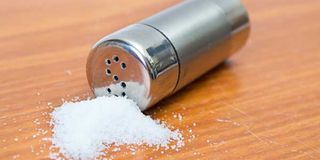Salt: a teaspoon a day is all you need

Are you one of those people who hog the salt shaker at the dining table or believe that the saltier the meat, the tastier it is? If your answer is yes, then you are hurtling to an early grave. PHOTO | FILE
What you need to know:
- The World Health Organisation (WHO) recommends a daily salt intake of not more than 2g, which is slightly less than a teaspoon. The less salt you consume, the better.
- “Bread, biscuits, and breakfast cereals are high in salt. Some vegetables also have a high content of sodium, which is a key element in the composition of salt,” she says.
- In 2012, a total of 17.5 million people perished from cardiovascular diseases, with high blood pressure being responsible for majority of these deaths.
Are you one of those people who hog the salt shaker at the dining table or believe that the saltier the meat, the tastier it is? If your answer is yes, then you are hurtling to an early grave.
The World Health Organisation (WHO) recommends a daily salt intake of not more than 2g, which is slightly less than a teaspoon. The less salt you consume, the better.
Research findings published in the British Medical Journal in January 2017, indicate that people in 181 out of 187 countries sampled exceed the WHO recommended daily limit for salt. And it’s not just your kitchen you should be looking at; according to Faith Kariuki, a nutritionist at Afya Bora Nutrition and Wellness Centre, 80 per cent of the salt consumed by humans comes from processed foods.
HIDDEN SALT
“Bread, biscuits, and breakfast cereals are high in salt. Some vegetables also have a high content of sodium, which is a key element in the composition of salt,” she says.
In 2012, a total of 17.5 million people perished from cardiovascular diseases, with high blood pressure being responsible for majority of these deaths. These worrying statistics prompted the UN Action Plan for the Prevention of Non-Communicable Diseases to prioritise on sodium intake reduction as one of the prime targets for all member states in the period between 2013 and 2020.
Countries in the European Union responded right off the bat, rolling out measures to moderate salt intake among their citizenry. The gains have been impressive. However, despite the cost-effectiveness of this approach, on a global scale, such efforts have been largely unsuccessful.
Most third-world countries, usually with shrunken budgets for health interventions, have failed to keep up the pace. This is despite the fact that too much salt triggers kidney failure, high blood pressure, heart attacks and even stroke.
To keep these illnesses from your door, Faith, the nutritionist, says that you must retrain your taste buds to make do with less salt. It is a painstaking process whose results are worth your life. A variety of ways to control sodium intake are recommended, starting right from the kitchen, before heading to the dining table.
Adopting safe and health-conscious lifestyle habits might just add a couple more years to your life.
*****
How to reduce intake
Discard the salt shaker: Adding salt to cooked food is a stubborn ritual that is hazardous. Teach your family to be content with the amount of salt added to food during preparation.
Stop using artificial seasoning: Stock cubes and soy sauces are notorious for high salt content. Keep these away from your kitchen if you want to stay healthy.
Embrace natural seasoning: While preparing foods, use fresh or dried herbs, garlic, ginger, cinnamon, onions, pepper and chillies. These are full of flavour and safe and healthy too.
What’ll happen if you don’t
Kidneys help to balance the level of body fluids and aid in blood pressure regulation in a process called homeostasis. This calls for a delicate balance between sodium and potassium levels to draw water from the bloodstream into a reservoir that leads to the bladder.
A slight increase in salt intake disrupts the level of sodium in the bloodstream and in turn disrupts normal blood pressure. This curtails the kidney’s ability to remove excess water from the bloodstream.
Higher water retention strains the blood vessels leading to the kidneys, which, if unchecked, may cause kidney failure.


